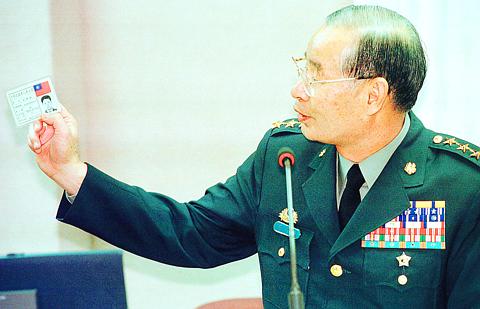Chief of the General Staff General Tang Yao-ming (
"Taiwan's air force does not maintain any secret or publicly known bases in foreign countries. But it does have a second-strike capability," Tang said at his first appearance at the legislature's Defense Committee following the March 18 presidential election. Tang was responding to inquiries from lawmakers over the reported plan to fly planes to a safe destination to avoid initial attacks and then use those aircraft to reinforce a second strike -- much like Iraq did during the 1992 Gulf War where it sent planes to neighboring Iran to avoid being destroyed by US-led allied forces.
Despite Tang's denial, sources speaking on customary anonymity told the Taipei Times that the government is in fact planning to make such a request to the Philippines as part of the terms for the continuing civil aviation talks between the two sides.

PHOTO: LIBERTY TIMES
"The Philippines is not the only choice for the air force in this matter. There are several other choices on the list. We don't know which country will be our final choice. But the groundwork will have been laid in advance of any eventuality," said the source.
Tang also made reference to the acquisition of new short- and medium-range surface-to-surface missiles which analysts expect will be brought into operation in the next few years, greatly enhancing the military's current arsenal.
DPP lawmaker Li Chih-hsiung (
Meanwhile, Tang shed some light on the military's plans to build its own surface-to-surface missiles.
"The cost for these missiles is very high. Each short-range missile costs around NT$20 million, while a medium-range one can run as high as NT$30 million. The operational cost for all the missiles will be billions of NT dollars," he said.
With the continuous modernization of the armed forces, Tang assured lawmakers that Taiwan still enjoys an advantage over China in its conventional warfare capability, although it is weaker in space and high-tech sectors.
Tang also conceded that there are some serious problems with the armed forces, especially in respect to the shortage of specialized personnel.
"The kinds of personnel which the armed forces are short of include non-commissioned officers [NCOs], officers at the level of captain, pilots, and company leaders in the army," Tang said.
"This personnel shortage is one of the most serious problems hampering the progress of the military's build-up. One of the major factors for the situation is the relatively low rate of pay," he said.
"The pay for an enlistee is obviously lower than that for a police officer or a public servant. If the salary for a serviceman is raised by 50 percent and the armed forces are still short of people, I will step down to take responsibility."
Lawmaker Wang Tien-ging (王天競) of the People First Party disagreed with Tang's assessment that salary was the main problem in the armed forces, saying that a serviceman's sense of honor and duty to his country should make up for the lack of pay.

AIR SUPPORT: The Ministry of National Defense thanked the US for the delivery, adding that it was an indicator of the White House’s commitment to the Taiwan Relations Act Deputy Minister of National Defense Po Horng-huei (柏鴻輝) and Representative to the US Alexander Yui on Friday attended a delivery ceremony for the first of Taiwan’s long-awaited 66 F-16C/D Block 70 jets at a Lockheed Martin Corp factory in Greenville, South Carolina. “We are so proud to be the global home of the F-16 and to support Taiwan’s air defense capabilities,” US Representative William Timmons wrote on X, alongside a photograph of Taiwanese and US officials at the event. The F-16C/D Block 70 jets Taiwan ordered have the same capabilities as aircraft that had been upgraded to F-16Vs. The batch of Lockheed Martin

GRIDLOCK: The National Fire Agency’s Special Search and Rescue team is on standby to travel to the countries to help out with the rescue effort A powerful earthquake rocked Myanmar and neighboring Thailand yesterday, killing at least three people in Bangkok and burying dozens when a high-rise building under construction collapsed. Footage shared on social media from Myanmar’s second-largest city showed widespread destruction, raising fears that many were trapped under the rubble or killed. The magnitude 7.7 earthquake, with an epicenter near Mandalay in Myanmar, struck at midday and was followed by a strong magnitude 6.4 aftershock. The extent of death, injury and destruction — especially in Myanmar, which is embroiled in a civil war and where information is tightly controlled at the best of times —

Taiwan was ranked the fourth-safest country in the world with a score of 82.9, trailing only Andorra, the United Arab Emirates and Qatar in Numbeo’s Safety Index by Country report. Taiwan’s score improved by 0.1 points compared with last year’s mid-year report, which had Taiwan fourth with a score of 82.8. However, both scores were lower than in last year’s first review, when Taiwan scored 83.3, and are a long way from when Taiwan was named the second-safest country in the world in 2021, scoring 84.8. Taiwan ranked higher than Singapore in ninth with a score of 77.4 and Japan in 10th with

SECURITY RISK: If there is a conflict between China and Taiwan, ‘there would likely be significant consequences to global economic and security interests,’ it said China remains the top military and cyber threat to the US and continues to make progress on capabilities to seize Taiwan, a report by US intelligence agencies said on Tuesday. The report provides an overview of the “collective insights” of top US intelligence agencies about the security threats to the US posed by foreign nations and criminal organizations. In its Annual Threat Assessment, the agencies divided threats facing the US into two broad categories, “nonstate transnational criminals and terrorists” and “major state actors,” with China, Russia, Iran and North Korea named. Of those countries, “China presents the most comprehensive and robust military threat